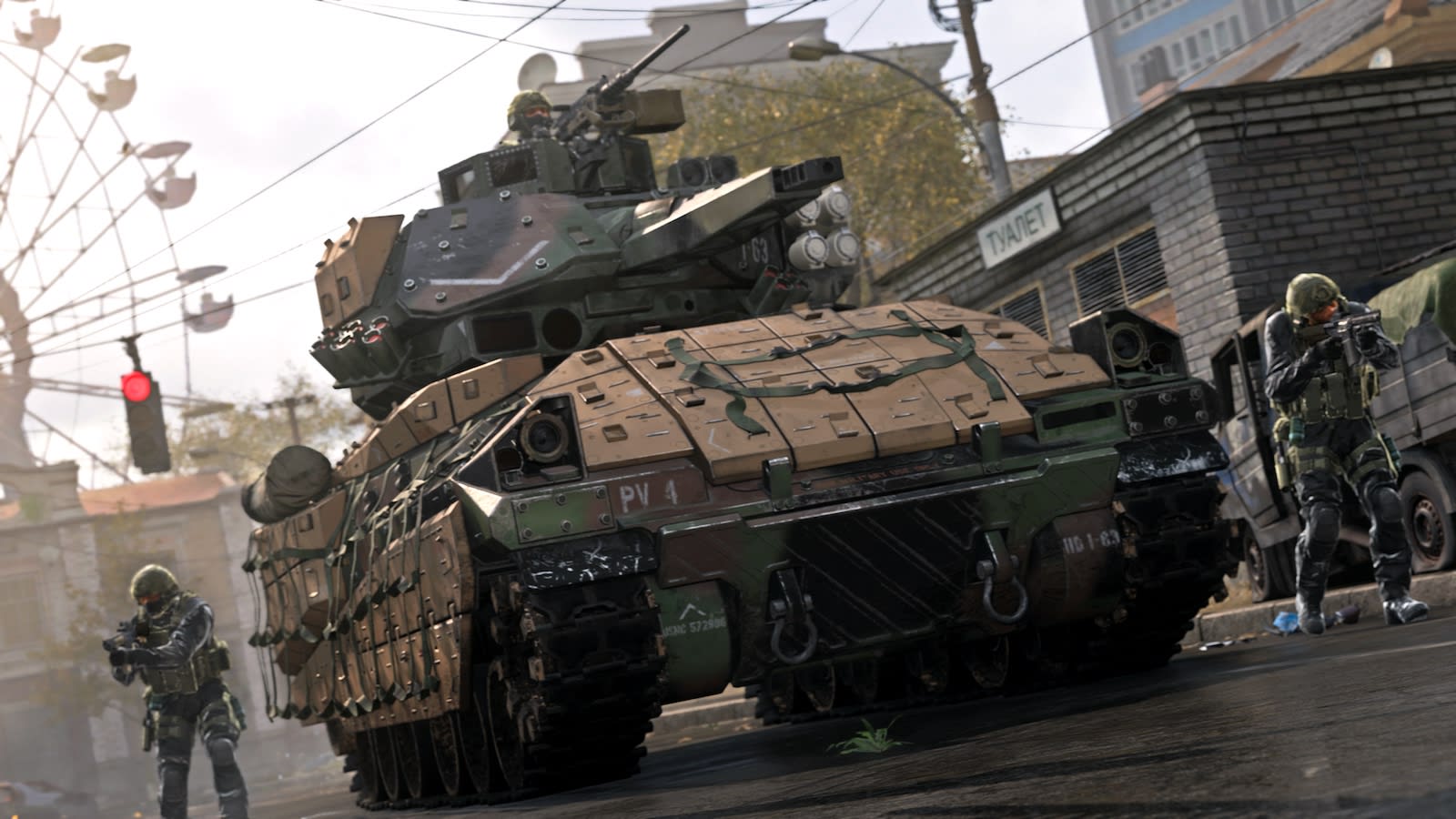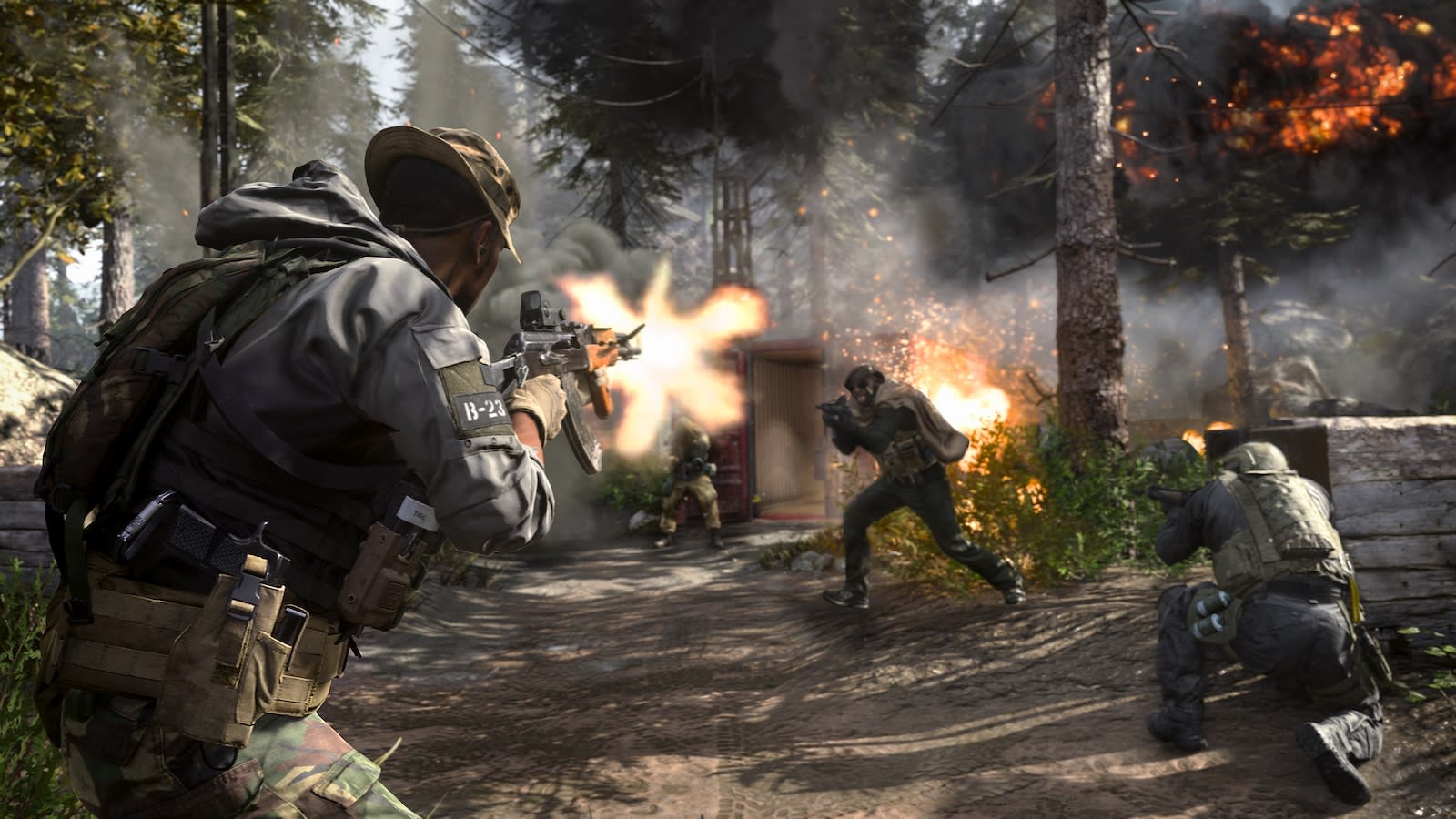Authenticity is important to the Modern Warfare team, whether in weapon design, location scouting, audio output, animation or narrative. It’s the second point Kelly mentioned in his multiplayer presentation, and it’s what developers come back to when their creative decisions are questioned. Each bullet fired has layers of lifelike, location-specific audio cues; animations have been upgraded to include realistic gun blur, recoil and movement speeds; activating night-vision goggles reveals details accurate to real-world infrared visuals; the scenes were painstakingly stitched together with photogrammetry and microtiling.
Modern Warfare is stacked with soldiers from the US, UK, Russia and other actual nations, and the Russian characters even speak in Russian, with subtitles. Meanwhile, the Syria proxy where Farah lives, Ursekstan, is completely fictional, and the characters from there speak accented English.
Developers at both presentations happily talked about consulting with Marines, SEALs and combat veterans as part of the research process. No one mentioned speaking with civilian survivors of war or former child soldiers. Not even ones from Ursekstan.
Developers were upfront in the initial May presentation that they were still working on Modern Warfare, and they wanted feedback so they could make alterations if necessary. One thing they’ve since removed is a line delivered by a Russian soldier, who talks about giving a young girl he’s captured to a commanding officer who “likes the young ones.”
In an interview with Kotaku at E3, before the line was removed, single-player design director Jacob Minkoff defended the game’s provocative civilian sequences by repeating the importance of being true to even the ugliest real-world war scenarios. He said Infinity Ward had consultants on staff to help with sensitive sections, but when he was pressed about the team’s research into war-time pedophilia, in support of that line, the mantra of authenticity fell aside.
“This is a fictionalized world,” he told Kotaku. “This is not real life. This is not real politics. This is not even a real country in the world. So, no. These events are not specific to any real-world research. What this is, is an entertainment product with a fictional story.”
That line, and a scene it apparently alluded to later in the game, won’t be in the final version.
There’s a dominant perspective at the heart of Modern Warfare (well, after waltzing past the USA-good, Russia-bad, Western-first foundation supporting this game and the entire Call of Duty series). It’s the soldier’s perspective.
Not that this is a surprise — Call of Duty is the first-person shooter. It’s a series about soldiers in battle, and it’s done well for itself with this model, even while stomping through cultural, moral and political minefields. However, with a campaign steeped in “authentic and gritty” wartime scenes, told from the perspective of people whose lives are being torn apart in the most violent way, in reality, right now, Modern Warfare is attempting to do something new. And Infinity Ward wants players to know it.
“We’re trying to be provocative, we’re trying to be edgy, but we’re not trying to be tasteless or overly sensational or anything like that,” Kelly said in May.
About an hour before the Modern Warfare multiplayer presentation kicked off, I heard an interview on NPR with Waad al-Kateab, the Syrian filmmaker behind the coming Frontline documentary For Sama. For five years, she filmed daily life in her hometown of Aleppo as it was consumed by war, choosing to stay, get married and have a child with her husband, one of the few remaining doctors in the city. Al-Kateab documented bombings, close calls and deaths by the day. She saw homes and hospitals destroyed in an instant, and filmed mothers weeping by the bodies of their children.
Not once during the interview was she asked to defend the authenticity of her story, nor did she offer to. Aleppo is hers to tell.
“We don’t have any more emotional distance from this kind of stuff than the men and women who put their lives on the line.”
“We don’t have any more emotional distance from this kind of stuff than the men and women who put their lives on the line and fight in these wars every day do,” Infinity Ward narrative director Taylor Kurosaki said in May. “That’s all. We’re not morbid. We’re not immune to things that feels shocking or are heavy, but if you’re going to be effective in the world of Modern Warfare, as an operator, as a fighter, as someone who has a chance of making a difference, you have to have a certain level of emotional detachment to be able to do your job. And so do we.”
Real-world war is not off-limits for video games. Some of the most powerful interactive experiences of the past decade have spawned from such trauma, such as 1979 Revolution: Black Friday and Bury Me, My Love. It’s notable that these games were built by or directly reference people who lived through the situations they cover.
As it stands, Modern Warfare is a first-person shooter built for esports and endlessly replayable multiplayer sessions, based on the idea of embodying a soldier in a contemporary battlefield. It also has a narrative campaign about the perceived reality of becoming a child soldier. These are fine goals individually, though they become uncomfortable when combined into a single billion-dollar product.
Quantifiably, the balance between single-player and multiplayer in Modern Warfare is off, and not only because multiplayer is Call of Duty’s bread-and-butter (the previous installment in the series didn’t even have a solo campaign). The solo portion of Modern Warfare considers the civilian’s perspective (a noble narrative goal) and the soldier’s perspective (a fun and necessary inclusion). Multiplayer, however, only considers the soldier. Fun naturally outweighs narrative. In a Call of Duty game, it has to. After all, “Gameplay is king.”
In this article:
activision, av, call of duty, call of duty modern warfare, editorial, gaming, Infinity Ward, modern warfare, personal computing, personalcomputing, war
All products recommended by Engadget are selected by our editorial team, independent of our parent company. Some of our stories include affiliate links. If you buy something through one of these links, we may earn an affiliate commission.
Jessica has a BA in journalism and she’s written for online outlets since 2008, with four years as senior reporter at Joystiq. She specializes in covering video games, and she strives to tell human stories within the broader tech industry. Jessica is also a sci-fi novelist with a completed manuscript floating through the mysterious ether of potential publishers.






